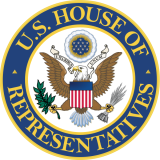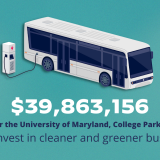Energy

As we grapple with the immediate and long-term impacts of global climate change, the United States has a moral obligation to act now. I am fighting to modernize our energy grid as quickly as possible to avoid the worst consequences of climate change while also addressing economic inequality, racial injustice, and environmental justice.
Unfortunately, the Republican budget and H.R. 1, the One Big Ugly Bill, take us in the wrong direction for our nation’s climate policy and energy independence. This reckless bill will cost Maryland over $18 billion by 2034, 14,000 jobs in the clean energy sector by 2030, and 5.9 gigawatts in electricity capacity by 2030–that’s enough energy to power 5.1 million homes for a year. Consumers and businesses will also see their bills increase. Natural gas, electricity, and gasoline prices are all expected to rise as a result of H.R. 1’s backwards investments in fossil fuels at a time when we need more renewable energy production than ever before.
Utility costs have continued to climb, even when adjusted for inflation, making it more difficult for hard-working Americans to keep the lights on and pay their bills. Household energy bills–the ones you and your family pay every month–will rise by $590 over the next 10 years under the Republican budget. Already, utility prices are rising because we have more demand for energy than ever before. Our country is continuing to experience extreme weather patterns, like unexpected heatwaves and cold fronts, and we have a duty to make essential utilities affordable for all Americans.
The environmental impact of traditional fossil fuels has come into sharper focus in recent years. Transitioning our economy to clean energy will create good-paying American jobs while guaranteeing we are responsible stewards of the natural environment. In Maryland’s Fourth Congressional District, I toured the SEMAConnect plant and had the opportunity to see how the workers there are pushing clean energy forward by overseeing the operation of one of the largest manufacturers of electric vehicle charging stations in the region. This plant has brought jobs to our district and clean resources to our communities. Unfortunately, cuts to clean energy tax credits in H.R. 1 threaten investment from businesses like this one. As your Congressman, I will fight to protect and expand our community’s innovations in clean energy.
Energy independence and production are vital for job creation, economic growth, and national security. But offshore oil drilling and massive increases in coal mining pose serious risks for our environment, economy, and future. Clean-energy tax credits, like those in the Inflation Reduction Act (IRA), are an excellent tool that level the market and make clean-energy choices work for everyday Americans’ wallets. We should build upon these gains, not peel them back. Our clean-energy future is a collective effort–one in which we should have business leaders, policy makers, climate advocates, and environmental researchers at the table working together.
Community Engagement and Public Education
We must be smart, practical, and dedicated to the clean energy transition as an essential reality for human health and economic growth. That is why I:
- Visited Ion Storage Systems (ION), a University of Maryland (UMD) startup operating one of the largest U.S. factories for solid-state batteries (SSBs). This plant produces batteries that charge faster and store more power than lithium-ion batteries. It’s no surprise that groundbreaking clean-energy solutions like this have come out of UMD’s Maryland Energy Innovation Institute.
- Hosted a Roundtable Discussion on data center proposals in Prince George’s County and their impact on the local community and economy.
- Toured the IonQ facility in College Park and met with CEO Peter Chapman to discuss the importance of quantum computing for the US economy and national security, especially as we work to remain competitive with China on the global stage.
- Secured over $25 million in federal funding to upgrade Prince George’s County’s bus transit system. This funding supported five new zero-emission buses, five new battery electric vans, new level four electric chargers, and brought us closer to achieving the County’s goal of a zero-emissions bus fleet by 2040.
As a member of the House Sustainable Energy and Environment Coalition, I promise to keep working towards a clean-energy transition in the 119th Congress.

